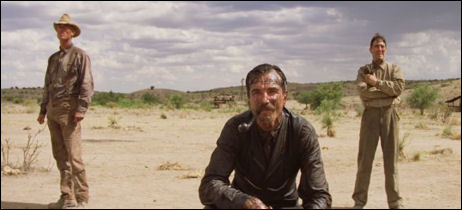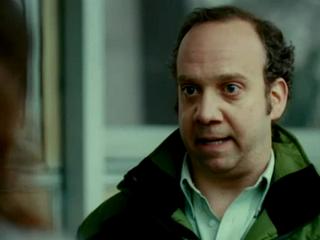Rating: ★★
| The Cast Away and the Pretty Woman |
Larry Crowne is the sort of movie you watch with anticipation of it being different somewhere along the way. I’m sure you’ve heard the joke by now that it’s two hours of Tom Hanks on a scooter, and that’s pretty much accurate. Obviously there’s a bit more to it than that, but that’s the gist of it. Tom Hanks is on a scooter, and he’s a nice guy who gets the girl. Spoiler? No, because you’ve seen movies about nice guys before. This one is no different. You can see it coming from about a mile away, just like a Vespa.
And there are tons of Vespas in this one. Our story begins with nine-time employee of the month Larry Crowne (Hanks) becoming a sudden ‘non-employee’ of the month when he’s downsized at the local retail store for not going to college. Sacked, and recovering from a crippling divorce in the middle of an awful economy, what’s a man to do? Well, he sells his worldly possessions, climbs aboard a scooter, and goes back to community college. At least that’s what people would do in Nia Vardalos’ world (remember how good her screenplay was for My Big Fat Greek Wedding?). I wonder if she would do the same if she were finally thrown out of Hollywood… Her films since Greek Wedding haven’t left too much to be desired.
There isn’t much to say about a movie that doesn’t have much to say. Larry Crowne is the ultimate everyman, but that doesn’t make him a character. The only true character in the film is barely discernable, and not even the focus. Julia Roberts plays Mercedes Tainot, Crowne’s “Speech 217” teacher - her life is hard, she hates teaching, and her marriage to her husband (Bryan Cranston) is crumbling. She does excellent work, as does Hanks admittedly, and their chemistry together is perfect. But when there’s nothing going on in the film to invest in, how do you invest in the characters? Sure, you can look around and find pieces of yourself… but that only goes so far.
Crowne joins a ‘gang’ of scooter-enthusiasts after making quick friends with the quirky, flirty, and beautiful Talia (Mbatha-Raw). This isn’t the type of gang you might think of. That would require the film to have some sort of conflict or dramatic engagement. No, this scooter gang is the type that might do a drive-by redecoration. Of course it’s hinted that both Crowne (whom she has renamed “Lance Corona”, as if it sounds cooler) and Talia might have feelings for each other, but note that she’s a flighty girl with a free spirit in a movie about a guy who needs a push in his life. That’s all you really need to know. The only true human relationship hinted at in the film is between Crowne and Mrs. Tainot, watching how their own personalities collide and push each other to grow.
It’s important to understand this - Larry Crowne isn’t a bad movie, anymore than Larry Crowne is a bad guy. It’s nice, sweet, and simple. Two hours of good stuff happening to a good guy. A good guy who rides a scooter and helps influence other people. And, this will sound weird, but… remember in That Thing You Do!, how there was so much positive energy floating around that you couldn’t notice that the film was terribly bland until after you finished watching it? Tom Hanks directed that the same way he directs this - positive flow; bland payoff. Once it was over, I felt like I had witnessed something uplifting and genuine, but in reflection while writing this, I couldn’t help but notice the utter lack of spirit surrounding the whole project. It’s as if Vardalos and Hanks simply wanted to pour sugar on something bitter.














